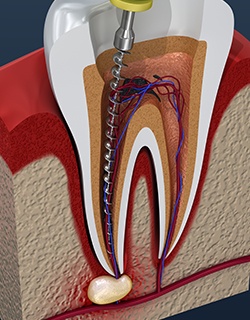Root Canal Therapy - Mount Pleasant, TX
Where Comfortable Care Always Comes First

When even our toughest patients hear they need a root canal, you can see the dread written all over their faces. The good news is, root canal therapy is actually very comfortable, and in fact, most patients experience almost immediate pain relief from this treatment. At the Mount Pleasant dental office of Robert C. Sikes, DDS, we offer safe, effective, pain relieving root canal therapy. If you believe you’re in need of root canal treatment, don’t put it off. Call our office right away. Root canals are most often treated on an emergency basis, and we will do our utmost to see you on the day you call.
Why Choose Us for Root Canal Therapy?
- Quick, easy and little to no discomfort
-
Save and restore your
natural smile - Eliminate sensitivity and any associated pain
When is a Root Canal Necessary?

Root canals are treatments for damage or decay that has reached the very innermost layer of the tooth. Called the pulp, this inner tooth layer houses the entire nerve structure. When decay or damage access the nerve, the result is the severe toothache pain and dental sensitivity that makes root canals such a dreaded procedure.
How do I Know I Need a Root Canal?

The only way to know for sure is to schedule an appointment with our team, so we can evaluate your smile and recommend the best treatments. However, please let us know right away if you experience any of the following root canal warning signs:
- Severe toothache - dull throbbing pain and/or stabbing pain when biting down
- Sensitivity - lingering sensitivity after the tooth is exposed to heat or cold
- Discoloration - the tooth may darken usually near the gum line
- Gum infection - you may notice inflamed, sore, or infected soft tissue surrounding the damaged tooth
What is the Root Canal Process Like?

When we determine you need a root canal, we will get to work right away. First, we numb the area around the tooth. This should immediately relieve the toothache you’ve been experiencing. Then, we will drill an access hole into the center of your tooth and extract the damaged nerve and pulp tissue. Following the removal of this damaged tooth structure, we may need to apply a topical antibiotic or prescribe oral antibiotics to ensure the infection is completely cleared up before we proceed. Then, we’ll refill the tooth with a biocompatible substance that will mimic the lost pulp structure. The access hole is refilled, and in most cases, patients will also need to have a dental crown placed. The crown strengthens and protects the treated tooth to prevent damage in the future.
How Long Will my Root Canal Last?

With proper care, your root canal treated tooth should last a lifetime. You’ll simply need to brush and floss daily and make regular visits to our Mount Pleasant dental office. If your root canal fails, it is most likely to do so soon after your original procedure. Stay vigilant in assessing any change in the way the treated tooth looks or feels for the first several weeks after your root canal. In some cases, we’re able to retreat and save the tooth if root canal failure is addressed in the early stages.
Root Canal FAQs
Can I Take Antibiotics Instead of Getting a Root Canal?
While you can take antibiotics to get rid of infections in almost every other part of the body, you cannot take antibiotics to eliminate an infection in your tooth. The reason for this is simple: your bloodstream cannot reach the pulp. So, the only way to alleviate your pain and restore your oral health is by getting the restorative care you need, like a root canal.
What Happens if You Wait Too Long for a Root Canal?
At first, taking the “wait and see” approach may not have disastrous consequences. With enough time, however, the nerve can die, and the tooth can get damaged to the point where it can no longer be saved. That’s why it’s so important to get a root canal when we first recommend it! Not only will this ensure that the infection is eliminated and that your pain is alleviated, but it will also protect your surrounding teeth and gums from being harmed.
Can Root Canals Be Prevented?
Most of the time, yes! That’s why we strongly recommend committing to good oral hygiene habits, like brushing twice a day, wearing a mouthguard during sports, and not over-indulging on cavity-causing foods, like potato chips. It’s also important that you come to our office every six months for a checkup and cleaning. That way, we can periodically examine your teeth and treat any oral health problems that do develop in the early stages.
Are Root Canals Painful?
Although you may have heard otherwise, root canals are NOT painful. That’s because the very first step of the treatment process is always the same: numbing your mouth. Then, after we’re done eliminating the infection, we will provide you with aftercare instructions, including taking OTC pain medication as directed. So, if you need a root canal, but have been hesitant to schedule your appointment because you’re worried about it hurting, don’t worry – we’re here to make the entire process as smooth, anxiety-free, and painless as possible.
Do Root Canals Make You Sick?
The myth that root canals make you sick usually stems from a study conducted back in the 1920s. Not only has this claim been disproven several times, but there also isn’t any scientific evidence that supports it. In fact, the opposite is true: not getting a root canal when you need one can result in the infection spreading throughout your body, negatively affecting your overall health in the process.
What Can I Eat After Getting a Root Canal?
We recommend waiting a few hours before eating anything. That way, the numbing agent has a chance to wear off. Once you’ve regained full sensation in your mouth, opt for something softer and more nutrient-dense, like cottage cheese, plain yogurt, or oatmeal. Just make sure to check the temperature first! Remember, your mouth will be more sensitive, so it’s important not to eat anything too hot or too cold.
